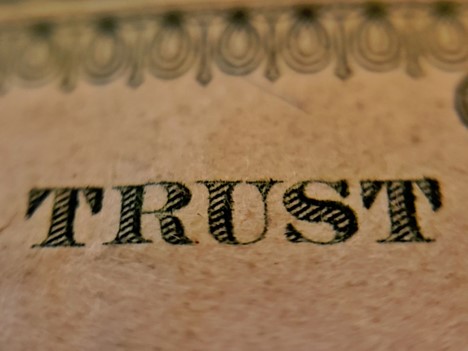To understand how trust works, it’s important to remember that trust is granted, not earned.
Trust allows leaders, employees, relationships, and organizations to flourish and grow. It is fundamental to most everything in life.
Lack of trust can lead to damaging relationships and a hostile environment. It creates stress and lowers energy.
When there is a strong foundation of trust in an organization, it can enhance and improve the workplace environment through collaboration, teamwork, and honest and open communication.
The Secret Behind How Trust Works is That it Must be Granted, Not Earned
How easily do you grant your trust to other people? What factors play into your ability or inability to trust specific individuals around you? What do people need to do to earn your trust?
As I reflect on these questions, I’m reminded of the importance and complexity of trust in our lives, work, and relationships.
Trust is one of the most critical elements of healthy relationships, families, teams, organizations, and communities. However, many of us have an odd or disempowered relationship to trust – we’ve been taught that people must earn our trust when, in fact, it’s something we grant to others.
Do You Have Trust Issues?
As an executive coach and consultant, I deal with clients who have issues dealing with trust every day.
It’s common for people to have trust issues, especially if they have past experiences which caused them to mistrust others. Past experiences can make it challenging to build trust with others.
This lack of trust may result from a betrayal at an early age, complicated past relationships, or a multitude of other life experiences. Many people struggle to grant people trust because of these past experiences.
I learned early in my life that it wasn’t always safe to trust people – my folks split up when I was three and we struggled financially as a family. Based on where and how I grew up, I found myself in some difficult situations. Part of my “street-smart, survival kit” was to be very suspicious of just about everyone I came into contact with. While this did serve me to a certain degree as a child and adolescent (at least in terms of survival), as I got older, I noticed that my resistance to trusting others created some real issues in my life, my relationships, and my work.
No matter how many “tests” I put people through to have them “earn” my trust, at the end of that whole process, it was ultimately up to me to grant them my trust (or not) – and then to continue to trust them (or not).

How We Build Trust is Often Determined By Our Past, Negative Experiences
How trust works is that we each have our internal process about it, which is often based on past experiences. In other words, if we’re burned, disappointed, or hurt in life and then decide, “I’m not doing that again,” we put up barriers around ourselves to keep us “safe.”
While this makes rational sense, it usually leaves us guarded, cautious, and insecure – unable to build trust and easily create meaningful and fulfilling relationships with people.
The irony is that no matter how guarded we are, how thick the walls we put up, or what we do to keep ourselves from getting hurt and disappointed, it usually happens anyway.
One of my mentors said to me years ago, “Mike, you’re living as though you’re trying to survive life. You have to remember, no one ever has.”
It’s important to remember that everyone goes through bad experiences. Overcoming challenges can help us grow and remind us that we’re strong enough to carry on.
What if We Granted Our Trust More Easily?
What if we were willing to make ourselves vulnerable, to count on other peoples in a healthy way, and to expect the best from them authentically?
Michael Bernard Beckwith calls this being “consciously naïve,” which may seem a little oxymoronic on the surface, but is a wise and profound concept at a much deeper level.
Will I get hurt? Yes! Will we be let down? Most certainly. Will people violate our trust? Of course. However, this will happen anyway – it’s just part of life.
Ironically, the more we are willing to grant our trust consciously, the more likely we are to create a real sense of connection, cooperation, and collaboration in our lives, relationships, families, teams, and more – even if we feel scared to do so or it seems counter-intuitive at times.
We almost always get what we expect in life. What if we start expecting people to be there for us, to do things that are trust-worthy, and to have our backs and our best interests in mind? As with just about everything else in life, it’s a choice.
As Albert Einstein so brilliantly stated, “The most important decision we make is whether we believe we live in a friendly or hostile universe.”
I choose “friendly,” how about you?
How easy is it for you to trust people? Are you willing to start granting your trust more easily? Share your thoughts, action ideas, insights, and more on my blog below.
My book, We’re All in This Together: Creating a Team Culture of High Performance, Trust, and Belonging, provides readers with a roadmap on how to build trust, collaborate, and operate at your peak level. Click here to learn more about it.
To learn more about how trust works, check out this blog post. You can also check out my podcast here.
I have written five books about, among other things, the importance of trust, authenticity, appreciation, and more. I deliver keynotes and seminars (both in-person and virtually) to empower people, leaders, and teams to grow, connect, and perform their best. As an expert in teamwork, leadership, and emotional intelligence, I teach techniques that allow people and organizations to be more authentic and effective. Find out more about how I can help you and your team achieve your goals today.
Feel free to leave any comments below or directly on my blog.
Liked this post? Here are three more!
The Magic of the Olympics
How We Move Forward…Together
Why Empathy is Important: How to Become More Empathetic
This article was originally published on June 17, 2010 and has been updated for 2021.


